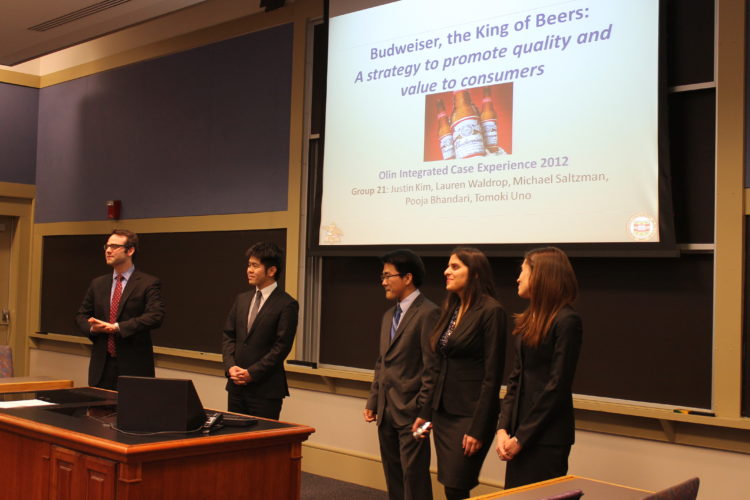When I received an email offering a “Coaching Opportunity” for Executive MBAs to participate in Olin’s Intensive Case Experience (ICE) Competition, part of the full-time MBA required course Critical Thinking and Impactful Communications, I read it and let it slide. The commitment was several hours on a weekend in December—a busy month for everyone.
But when I received a second email on “Giving Tuesday” requesting volunteers, I sucked it up and offered up my Saturday.
It was the most satisfying volunteer experience I have ever had.
To begin with, Patrick Moreton, Senior Associate Dean of Graduate Programs, provided the volunteer EMBAs with an abstract of the student assignment, considerable context around the problem at hand, as well as the expectations of the volunteer coaches. The one-hour session was reminiscent of EMBA lectures, including an explanation of the case and the challenge to the students: “Suggest opportunities to disrupt Monsanto’s business using NLP (Natural Language Processing) and AI (Artificial Intelligence) in marketing and customer strategy.” I mean, how cool is that?
Monsanto and Amazon had presented the context of the problem and potential solutions to the student teams, and the teams were now in the process of preparing competitive presentations. Amazon and Monsanto offered office hours during the weekend to answer questions from the teams. The winning team would have the opportunity to present their idea to Monsanto.
Happy to hear that the full day commitment had been whittled down to four hours, the EMBAs each had an assigned conference room and three student teams scheduled to show up for one hour apiece.
During the prep, Moreton emphasized the importance of not providing answers, but asking the right questions.
-
Be the boss, but not the kind that tells people what to do
-
Resist your impulse to answer the question because you know it
-
Make sure everyone is heard
As I listened to each of the teams I worked with, I was surprised how little I needed to know about the specific topic to assist them with honing their ideas. Each team came in with ideas that, after one hour of work, were further developed and more refined. You can’t ask for more than that from a volunteer experience.

Patrick Moreton, Senior Associate Dean of Graduate Programs, prepped volunteers on how to coach MBA ICE teams.
I asked Moreton after my coaching sessions why he extended the opportunity to EMBAs. “We do a fair amount of work with peer coaching, but it’s difficult for a peer to give the same level of feedback as someone who has more experience. The trick is to get people with more experience who understand that they’re not there to answer the questions, they’re there to help develop the people,” he said.
In addition, MBA students are interested in networking with EMBAs. Unlike opportunities for coffee or an Olin-sponsored cocktail party, coaching gives MBA students and EMBA alumni opportunities to connect on a different level. “From my perspective, people make relationships when they work together and when you have a shared purpose to really come together as a team. This is not just to give them the name of an EMBA to have coffee with, it’s a chance for them to demonstrate the value of being in that person’s network,” he said.
A fellow EMBA 43 alum, David Jackson, also volunteered as a coach. I asked him why he did it.
“For the same reason you still see Lou Brock and retired Cardinals baseball players hanging around the clubhouse. While I was not anywhere close to as good of a student as Brock was a baseball player, I enjoy engaging with and helping develop business students in the same way he still helps develop world-class athletes. Moreover, coaching is the best way to refine my leadership skills and learn new ideas and tricks from the students,” he said.
What I found satisfying was the realization that my Executive MBA degree, and my years of business experience, are truly valuable to young professionals. It isn’t necessary to know the details—I have a framework of expertise that applied to business problems of all kinds is an asset and can help others learn and grow. This is a gift I wish every EMBA could receive.




